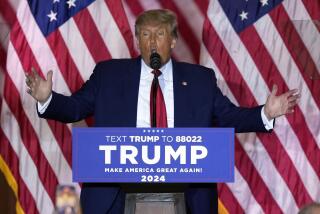Bush Camp Looks to Nixon in ’60
- Share via
In a slew of odd moments in this troubled election came the one this week when top advisors to George W. Bush began invoking the name of Richard Nixon.
Nixon, they have said time and again, perhaps in the hope that Vice President Al Gore is listening, “put the country’s interest first” by accepting his narrow loss to John F. Kennedy in 1960.
While Nixon conceded the election--in which Kennedy prevailed in the overall popular vote by a slim 119,450 ballots--some historians say he probably had little choice.
And the circumstances that year hinged not on one state, or even three or four, but 11 states where Republicans originally sought recounts in the hopes that the election could be turned in their favor.
News reports at the time said Vice President Nixon and then-Republican National Committee Chairman Sen. Thruston B. Morton of Kentucky had discussed demanding recounts in Delaware, Illinois, Michigan, Minnesota, Missouri, Nevada, New Mexico, New Jersey, Pennsylvania, South Carolina and Texas.
Nixon immediately denied the story, with his spokesman saying the vice president had spoken to Morton only to discuss Morton remaining as chairman.
In the states where Republicans were prepared to fight, Kennedy’s lead ranged from 2,294 in New Mexico (four electoral votes) to 116,326 in Pennsylvania (32 electoral votes). In the disputed states, Kennedy’s margin of victory was between 0.2% in Illinois and 2.4% in Pennsylvania.
And Kennedy won 303 electoral votes to Nixon’s 219.
And there was another key difference in 1960. As historians, such as Nixon biographer Stephen E. Ambrose, have pointed out, a recount in Illinois--where massive voter fraud by Mayor Richard J. Daley’s political machine in Chicago was alleged--could have taken as long as 18 months because of procedural problems. And in Texas, where Kennedy’s running mate, Lyndon B. Johnson, delivered a Democratic victory, there were no provisions at all for a recount.
Kennedy’s lead in Illinois: 8,858.
His lead in Texas: 46,257.
It had been a hard-fought campaign with almost eerie similarities to this one. A sitting vice president perceived to have a problem with his personality (he wasn’t likable) ran against an up-and-coming young politician from a well-connected family who was criticized by some as not being ready for the nation’s top office.
Allegations of fraud were lobbed by both sides. In Indiana, where Nixon prevailed by more than 200,000 votes, a local Democrat told the New York Times that his major complaint was that “the move-aways, vacant lots and tombstones are voting.”
In the early morning hours of Nov. 9, the day after the election, Nixon gave a non-concession concession.
“While there are still some results to come in--if the present trend continues, Mr.--Sen. Kennedy will be the next president of the United States,” said Nixon, who went on to win the presidency in 1968, only to resign amid scandal in his second term.
Nixon later said that, with the volatile situation in the world, a Cold War in process and an ongoing crisis in Cuba, he didn’t feel he could risk a drawn-out challenge. And he reportedly discouraged President Eisenhower from pursuing a recount.
Which brings us to today and the accolades the once-disgraced leader now is receiving.
Former Secretary of State James A. Baker III, who is heading the Bush recount monitoring, cited Nixon, as well as Gerald R. Ford (who lost to Jimmy Carter by more than 1.6 million votes in the 1976 general election), as models of gracious defeat for Gore to emulate.
So did Bush spokeswoman Karen Hughes.
And on Saturday, Alexander M. Haig Jr., who was Nixon’s last White House chief of staff, had kind words for his former boss.
“I knew Richard Nixon,” said Haig, after marching in a Veterans Day parade in West Palm Beach, Fla. “Richard Nixon had the grace, even though he knew there were irregularities in Illinois in the 1960 presidential election and that he had probably won the election, he had the good grace not to challenge the election results and not disrupt our Constitution.”
But Larry Sabato, a University of Virginia professor who has studied election fraud, said Republicans are wearing rose-colored glasses.
“Of course it was very different but they don’t care what the facts are,” he said. “Nixon did what was best for Nixon. The truth is, the Republicans in downstate Illinois stole thousands of votes, too, and Nixon knew if he pursued it he’d expose his allies.”
More to Read
Get the L.A. Times Politics newsletter
Deeply reported insights into legislation, politics and policy from Sacramento, Washington and beyond. In your inbox three times per week.
You may occasionally receive promotional content from the Los Angeles Times.











